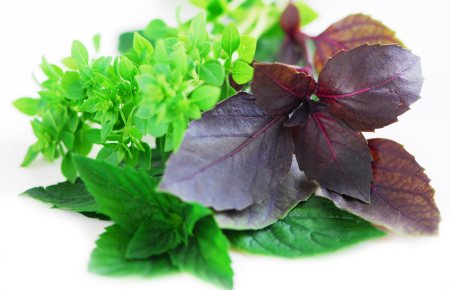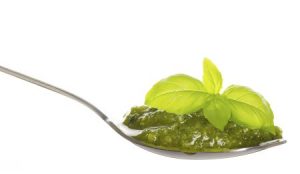Basil, ‘The Oldest Herb’ is one of my favorites for cooking and health. Discover its balancing health benefits, its amazing history and trivia, and many delicious recipes.
Basil has a distinct flavour which means that you can’t just add it to any dish you make and expect it taste good. But when it works, it is delicious.
7 Health Benefits of Basil
1. Powerful anti-inflammatory from essential oils:
Eugenol, citronellol, linalool, citral, limonene and terpineol are a just few of the oils in basil.
The enzyme-inhibiting effect of the eugenol can help with rheumatoid arthritis or inflammatory bowel conditions.
2. DNA Protection
Orientin and viceninare – two water-soluble flavonoids were found to help white blood cells protect cell structures as well as chromosomes from radiation and oxygen-based damage.

3. Promotes cardiovascular health
High levels of magnesium help muscles and blood vessels relax, improving blood flow.
4. Anti-Bacterial Properties
The oils in basil provide protection against unwanted bacterial growth similar to oregano oil (from the same plant family)
- Inhibit strains of bacteria (Staphylococcus, Enterococcus and Pseudomonas) which are widespread and have developed resistance to treatment with antibiotic drugs. – Journal of Microbiology Methods, (September 2003)
- Inhibits Shigella, an infectious bacteria that triggers diarrhea. This is why its a good idea to include basil and thyme in you salad dressings. – Food Microbiology, February 2004
5. In ancient times it was been used as an antidote for snake bites, and gave people strength during religious fasting.
6. Stimulates the appetite and helps curb flatulence.
Basil tea is said to help with dysentery, nausea, and stomach distress due to gas.
7. Alkalizes the Body
Like all ‘greens’ basil provides alkalizing minerals to balance against the typical acidic diet. Basil is so full of phytonutrients that it is also considered a herb in all health systems.
“A man taking basil from a woman will love her always.” Sir Thomas Moore
You can also LISTEN to me explaining these benefits in a short fun video presentation at Basil Health Benefits. Check it out!
So Many Types of Basil
There are 35 types of Basil plants that belong to the mint family.
They range from annuals to perennials and shrubs.
Holy basil is the most famous – known for its medicinal and spiritual qualities.

Here are 10 of the most common Basils
Basil Trivia:
- Basil has always been a token of love in Italy.
- Basil is Greek for ‘royal’ or ‘kingly’.
- In ancient Greece and Rome, doctors believed the growers needed to scream wild curses to grow it successfully.
- In old India, basil was cherished as a symbol of hospitality.
- There were many superstitions in ancient times about Basil. One was they believed that a basil leaf left under a pot would in time turn into a scorpion and smelling the plant could bring a scorpion into the brain.
- When a Romanian boy accepts a sprig of basil from his girl, he is engaged.
- Basil was used for embalming ancient Egyptian mummies
- In India, every good Hindu goes to rest with a Basil leaf on his breast. This is a passport to Paradise.
- It was called the herb of poverty and the idea is that it would help protect those in need.
- Sweet basil herb is known across cultures to naturally increase sex drive and fertility by fostering a feeling of total relaxation in the body and muscles while increasing circulation.
- In Italy, it is a symbol of love.
- The scent of basil was said to drive men wild — so much so that women would dust their breasts with dried and powdered basil
Basil Nutrition:
Basil is a rich source of many essential nutrients, minerals, and vitamins. It is a very good source of iron, and calcium, and a good source of potassium and vitamin C. Learn more here: Basil Nutrition
Basil History
- Basil is native to tropical Asia and India; it has been cultivated there for more than 5,000 years.
- Its name is derived from the Greek basileus which means king.
- Ancient records from 907 A.D. indicate sweet basil in the Hunan region of China. It migrated westward as whole plants, since it could be grown easily indoors away from frost exposure.
- Today, basil is not only used as a food flavouring, but also in perfume, incense, and herbal remedies.
Basil Safety Concern:
- Basil might be UNSAFE when used when used in significant quantities long-term. It contains estragole, a chemical that might increase the risk of getting liver cancer. Concentrated basil oil can, therefore, be UNSAFE due to the estragole content. Read more at Medicine Net.
These concerns are based on studies with very high doses applied to mice. - In some people basil can cause low blood sugar.

How to Cook, Buy and Store Basil

Basil has a distinct flavor which means that you can’t just add it to any dish and expect it taste good. When it works though, it is delicious. Read my Tips For Cooking With Basil.
My Favourite Basil Recipes:
Vegan Pesto: This is both fresh and raw and delicious.
Basil Tea: For nausea and indigestion
Tasty Recipes with Basil I am a great fan of basil as you will find it in many recipes on my site.

